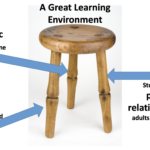Classroom management and academic engagement are two of the most important aspects of getting off to a great start in the new school year. Though gem/marble jars, tickets, clip charts, and other incentive systems (including traditional grades) are common throughout
Are you a teacher struggling to keep your students engaged? You’re not alone. A team of teachers at Sandown North Elementary School faced similar challenges, witnessing a decline in student engagement and an uptick in students that were dysregulated. Instead
You may think of the first weeks of school as a time to focus on classroom management, and it is. But in fact, all year long, we should consider classroom management an active part of our daily teaching. How do
Kathy Collins and I were co-teaching a summer workshop for teachers on how to teach reading effectively. We were sharing about different kinds of direct instruction—various ways we can teach students the skills, strategies, and mindsets they need to be
A great learning environment is like a three-legged stool. Ruth Charney first introduced this concept to me years ago. It’s an important idea to keep in mind all year long, but it’s crucial during the first weeks of school.
The
A few years ago my wife gave me three months of coaching for my birthday. I’d been running 5K road races and was trying some half-marathons. She thought I could use some professional help! We connected online, and I sent
My wife and I loved watching Ted Lasso. In fact, when our daughter came home from college for the holidays, we got her into it and watched both seasons again! One of the most powerful and uplifting scenes comes in
Even if you haven’t binge-watched Ted Lasso like I have (twice!), you’ve probably heard of it. In this blog post, we’ll explore one of Ted Lasso’s classic lines: Be a Goldfish and consider how it might help us when we’ve
A Brief History of Behaviorism, Part 5
If you could travel back in time about 60 years and walk through a typical school, you might be surprised to find something missing. You wouldn’t see behavior charts or “star student” award
A Brief History of Behaviorism, Part 4
If you could travel back in time about 60 years and walk through a typical school, you might be surprised to find something missing. You wouldn’t see behavior charts or “star student” award
A Brief History of Behaviorism, Part 3
If you could travel back in time about 60 years and walk through a typical school, you might be surprised to find something missing. You wouldn’t see behavior charts or “star student” award
A Brief History of Behaviorism, Part 2
If you could travel back in time about 60 years and walk through a typical school, you might be surprised to find something missing. You wouldn’t see behavior charts or “star student” award
A Brief History of Behaviorism, Part 1
If you could travel back in time about 60 years and walk through a typical school, you might be surprised to find something missing. You wouldn’t see behavior charts or “star student” award
Do your students seem young this year? You’re not alone. In every single school I’m working in this year—with no exceptions—teachers are saying the same kinds of things.
This shouldn’t be surprising. Students always seem a bit young in the
It is now widely recognized that social-emotional learning (SEL) should be an integral part of teaching and learning in schools. Yet it sometimes feels so overwhelming. SEL is just so…BIG. How do you know where to start?
Some districts purchase
“To weave the magic of a thing, you see, one must find its true name. In my lands we keep our true names hidden all our lives long, from all but those we trust utterly; for there is great power,
The last weeks of school are a tumultuous time of transition. Not all students look forward to summer vacation, and even ones who do are likely anxious about next year. For some students, next year brings a new school, not
Teacher language can be a great focus for a New Year’s resolution. After all, we all use language with students, and we all surely have some habits that could use some refinement. Often, some of our language habits don’t line
Games can boost engagement and learning for students while also reducing teacher workload--a win-win!
Last week I had the privilege of teaching two online workshops for teachers about getting ready for the upcoming school year. They were both so much fun! We played games that teachers can use with their students (either in person
We want students to be more than compliant, don’t we? In addition to doing the right things, we want them to do so for the right reasons. We want students to pick up trash to keep the room clean, to be
Consequences are complicated. You can’t have an effective approach to discipline without them, yet they can’t be the focus of discipline either. In schools, there are often many different opinions about what appropriate consequences are and how they should be
This article appeared in the Responsive Classroom Newsletter: November 2015 (https://www.responsiveclassroom.org/article/our-classroom-walls)
During the school day we spend most of our time in our classroom and so do twenty to thirty students (give or take a few!). Many of us feel
How do you refer to the students in your class when addressing them? At first glance, this may seem like a trivial issue; but consider how many times throughout the day we speak to students to get their attention. The
December 16, 2012, Responsive Classroom Blog, Original Link: https://www.responsiveclassroom.org/blog/no-ordinary-monday
Teachers, principals, and other school staff nationwide are thinking about what to do and what to say tomorrow when they and their students return to school in












